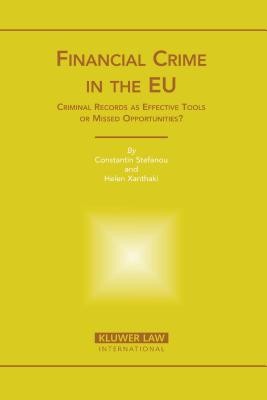
- We will send in 10–14 business days.
- Author: Constantin Stefanou
- Publisher: Kluwer Law International
- Year: 2006
- Pages: 372
- ISBN-10: 9041123644
- ISBN-13: 9789041123640
- Format: 15.6 x 23.4 x 2.2 cm, hardcover
- Language: English
- SAVE -10% with code: EXTRA
Reviews
Description
There is little doubt that a series of EU Directives on money laundering and on public procurement have not reduced the incidence of financial crime in public contracts, in banking transactions, or in dealings among the ¿vulnerable¿ professions (mainly accountants, lawyers, and notaries). It is the convincingly argued thesis of this book that this failure stems directly from the dependence of these EU Directives on national laws criminal records. Harmonisation of these laws, the book demonstrates, is not only necessary but urgent. In eighteen incisive essays, leading European authorities in the field provide in-depth discussion of such elements of the subject as methodologies for collecting criminal records, the authorities maintaining such records, the contents of such records and who has access to them, and conflicts with human rights and privacy legislation. The authors show that these factors and other vary enormously from country to country. They recommend EU initiatives that clearly mandate such specifications as the following: efficient exchange of criminal record data among national authorities;which crimes lead to compulsory exclusion from employment, membership, or participation in banking or public tenders;the specific types of employment, membership and participation affected;erasure period for convictions;level of acces for banks, professional associations, and tendering authorities to criminal records; andexchange of criminal record data in the framework of EU data protection legislation. Standing as it does at a pressure point where criminal law collides with human rights on the one hand and public contracts on the other, this seminal work has a great deal to offer interested parties in several diverse fields of law and administration. The findings and recommendations of its authors are sure to evoke debate across a broad spectrum of academic, professional, and policymaking endeavour
EXTRA 10 % discount with code: EXTRA
The promotion ends in 19d.00:38:01
The discount code is valid when purchasing from 10 €. Discounts do not stack.
- Author: Constantin Stefanou
- Publisher: Kluwer Law International
- Year: 2006
- Pages: 372
- ISBN-10: 9041123644
- ISBN-13: 9789041123640
- Format: 15.6 x 23.4 x 2.2 cm, hardcover
- Language: English English
There is little doubt that a series of EU Directives on money laundering and on public procurement have not reduced the incidence of financial crime in public contracts, in banking transactions, or in dealings among the ¿vulnerable¿ professions (mainly accountants, lawyers, and notaries). It is the convincingly argued thesis of this book that this failure stems directly from the dependence of these EU Directives on national laws criminal records. Harmonisation of these laws, the book demonstrates, is not only necessary but urgent. In eighteen incisive essays, leading European authorities in the field provide in-depth discussion of such elements of the subject as methodologies for collecting criminal records, the authorities maintaining such records, the contents of such records and who has access to them, and conflicts with human rights and privacy legislation. The authors show that these factors and other vary enormously from country to country. They recommend EU initiatives that clearly mandate such specifications as the following: efficient exchange of criminal record data among national authorities;which crimes lead to compulsory exclusion from employment, membership, or participation in banking or public tenders;the specific types of employment, membership and participation affected;erasure period for convictions;level of acces for banks, professional associations, and tendering authorities to criminal records; andexchange of criminal record data in the framework of EU data protection legislation. Standing as it does at a pressure point where criminal law collides with human rights on the one hand and public contracts on the other, this seminal work has a great deal to offer interested parties in several diverse fields of law and administration. The findings and recommendations of its authors are sure to evoke debate across a broad spectrum of academic, professional, and policymaking endeavour


Reviews